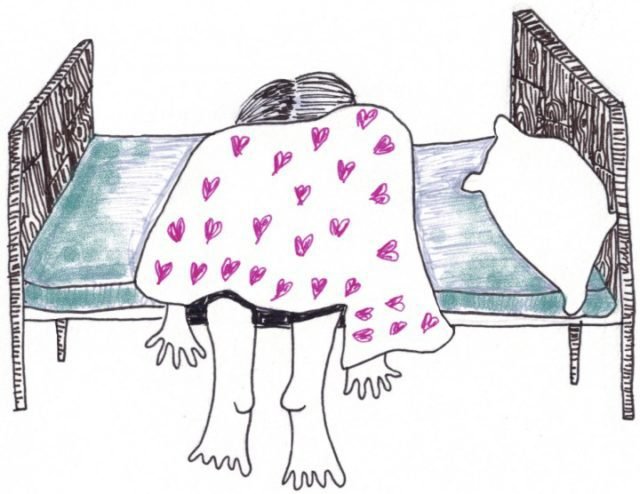Voluntary Sleep Deprivation #3: A Pathological Link Between Obesity and Diabetes Mellitus
Introduction
In previous instalments of this series, sleepless night was shown to be capable of altering the production of chemicals and hormones in an individual's body. This is one of the reasons why voluntary sleep deprivation is considered a life threatening activity.
While considering the awry production of hormones due to an individual's failure to prioritize a good night sleep; excluding the risk of obesity and diabetes will only make the discussion incomplete.
How sleep deprivation causes obesity and diabetes mellitus

Image source: Author: David Cunnington
In order to understand how sleep deprivation act as a bridge between obesity and diabetes, one must first understand the mode of action of the hormones responsible for regulation of appetite.
The major hormones that regulate appetite are ghrelin and leptin. In regulation of appetite, the hormone ghrelin is responsible for hunger stimulation, whereas leptin is responsible for suppression of appetite. It might interest you to know that sleep deprivation has a direct effect on these two (2) hormones.
This is the major reason why people consume a lot of food while trying to stay awake. This habit is activated by the increase stimulation of ghrelin while the action of leptin is however reduced. Since appetite is stimulated, one tries to satisfy the hunger with any food available at the moment. Obesity which is caused mainly by consumption of excessive food is therefore triggered.
Also, from personal experience, the major type of food substance consumed when an individual is sleep deprived is basically carbohydrate (sugary food). However, whether the food consumed is carbohydrate or not, the fact is other classes of food are always converted to glucose during metabolism in order to be taken up easily by cells. Hence, since sleep deprivation increases food consumption due to stimulation of the hunger hormone (ghrelin), glucose concentration is also increased in blood.
In a normal situation, increase amount of glucose in blood should cause the beta (β) cells of the pancreas to secrete an hormone called insulin, responsible for regulating glucose concentration. However, the hunger hormone (ghrelin) hinders this biochemical process from occurring thereby leading to type 1 diabetes (also known as Insulin dependent diabetes mellitus).
Aside from ghrelin triggering type 1 diabetes by inhibiting the function of the beta cells of the pancreas, the accumulation of glucose concentration in blood by a sleep deprived obese individual causes the body to develop type 2 diabetes. Type 2 diabetes (also known as non-insulin dependent diabetes mellitus) is a disease condition where the body develops insulin resistance, and is unable to regulate glucose concentration in blood.
Insulin resistance is a state in which more insulin is needed to bring about the biological effects that would have been produced by a lower amount of insulin.
Effects of obesity and diabetes mellitus to the body
After considering how sleep deprivation causes both obesity and diabetes mellitus, the important question is, what are the effects of these disease conditions to the human body?.
According to the Centre for Disease Control (CDC), more than 80% of the obese persons have type 2 diabetes. So it means that the resultant effects suffered by diabetic patients would likely be the same fate for obese individuals.
In the body, the three main systems affected are: the circulatory system, nervous system and urinary system.
Effects on circulatory system: Diabetes is capable of damaging both the large and small blood vessels, leading to macrovascular disease and microvascular disease respectively. Examples of macrovascular diseases include heart attack and stroke, while examples of microvascular diseases include eye and kidney problems.
Effects on nervous system: Diabetes causes neuropathy (nerve damage) due to blood vessels not delivering enough oxygen.
Effects on urinary system: Overtime, diabetes damages damages blood vessels in the kidney, preventing filtration of waste from blood.
Summary
One's ability to carry out the usual daily activities despite a small amount of sleep may be a bragging point, but the end result is nothing to be proud of. From the article, we are made to understand that the hormones regulating appetite is greatly affected when one is deprived of a quality sleep, hence altering other important biochemical processes.
It is therefore important that we start prioritizing a quality night sleep in order to live a good and healthy life. This was the concluding part of the series and I hope you were enlightened. Once again, thanks for doing this with me. Till next time. Sleep well, stay healthy.
References
Ghrelin. Retrieved 21st May, 2018
Leptin. Retrieved 21st May, 2018
Obesity. Retrieved 21st May, 2018
Diabetes mellitus. Retrieved 21st May, 2018
Effects of sleep deprivation on obesity and diabetes mellitus. Retrieved 21st May, 2018
Nelson, D. and Cox, M. (2013). Principles of Biochemistry, 6th Edition. New York: W. H. Freeman and company, pp. 611, 968-970.
Voet, D., Voet, J. and Pratt, C. (2013). Fundamentals of Biochemistry, 4th Edition. United States of America: John Wiley & sons Ltd., pp. 786-790.
